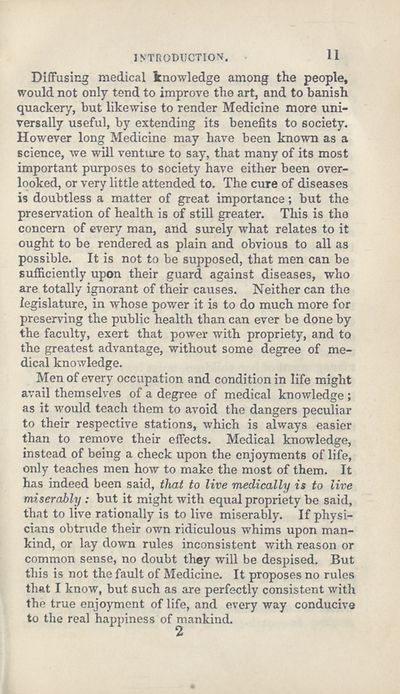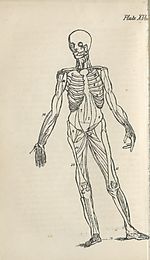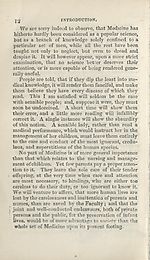Diseases > Domestic medicine
(45)
Download files
Complete book:
Individual page:
Thumbnail gallery: Grid view | List view

INTRODUCTION.
Diffusing medical knowledge among the people,
would not only tend to improve the art, and to banish
quackery, but likewise to render Medicine more uni¬
versally useful, by extending its benefits to society.
However long Medicine may have been known as a
science, we will venture to say, that many of its most
important purposes to society have either been over¬
looked, or very little attended to. The cure of diseases
is doubtless a matter of great importance; but the
preservation of health is of still greater. This is the
concern of every man, and surely what relates to it
ought to be rendered as plain and obvious to all as
possible. It is not to be supposed, that men can be
sufficiently upon their guard against diseases, who
are totally ignorant of their causes. Neither can the
legislature, in whose power it is to do much more for
preserving the public health than can ever be done by
the faculty, exert that power with propriety, and to
the greatest advantage, without some degree of me¬
dical knowledge.
Men of every occupation and condition in life might
avail themselves of a degree of medical knowledge ;
as it would teach them to avoid the dangers peculiar
to their respective stations, which is always easier
than to remove their effects. Medical knowledge,
instead of being a check upon the enjoyments of life,
only teaches men how to make the most of them. It
has indeed been said, that to live medically it to live
miserably : but it might with equal propriety be said,
that to live rationally is to live miserably. If physi¬
cians obtrude their own ridiculous whims upon man¬
kind, or lay down rules inconsistent with reason or
common sense, no doubt they will be despised. But
this is not the fault of Medicine. It proposes no rules
that I know, but such as are perfectly consistent with
the true enjoyment of life, and every way conducive
to the real happiness of mankind.
Diffusing medical knowledge among the people,
would not only tend to improve the art, and to banish
quackery, but likewise to render Medicine more uni¬
versally useful, by extending its benefits to society.
However long Medicine may have been known as a
science, we will venture to say, that many of its most
important purposes to society have either been over¬
looked, or very little attended to. The cure of diseases
is doubtless a matter of great importance; but the
preservation of health is of still greater. This is the
concern of every man, and surely what relates to it
ought to be rendered as plain and obvious to all as
possible. It is not to be supposed, that men can be
sufficiently upon their guard against diseases, who
are totally ignorant of their causes. Neither can the
legislature, in whose power it is to do much more for
preserving the public health than can ever be done by
the faculty, exert that power with propriety, and to
the greatest advantage, without some degree of me¬
dical knowledge.
Men of every occupation and condition in life might
avail themselves of a degree of medical knowledge ;
as it would teach them to avoid the dangers peculiar
to their respective stations, which is always easier
than to remove their effects. Medical knowledge,
instead of being a check upon the enjoyments of life,
only teaches men how to make the most of them. It
has indeed been said, that to live medically it to live
miserably : but it might with equal propriety be said,
that to live rationally is to live miserably. If physi¬
cians obtrude their own ridiculous whims upon man¬
kind, or lay down rules inconsistent with reason or
common sense, no doubt they will be despised. But
this is not the fault of Medicine. It proposes no rules
that I know, but such as are perfectly consistent with
the true enjoyment of life, and every way conducive
to the real happiness of mankind.
Set display mode to:
![]() Universal Viewer |
Universal Viewer | ![]() Mirador |
Large image | Transcription
Mirador |
Large image | Transcription
| Antiquarian books of Scotland > Diseases > Domestic medicine > (45) |
|---|
| Permanent URL | https://digital.nls.uk/119888682 |
|---|
| Description | Thousands of printed books from the Antiquarian Books of Scotland collection which dates from 1641 to the 1980s. The collection consists of 14,800 books which were published in Scotland or have a Scottish connection, e.g. through the author, printer or owner. Subjects covered include sport, education, diseases, adventure, occupations, Jacobites, politics and religion. Among the 29 languages represented are English, Gaelic, Italian, French, Russian and Swedish. |
|---|

